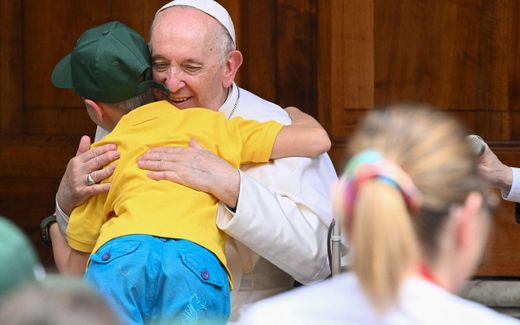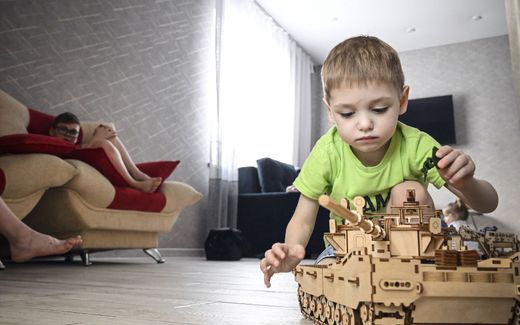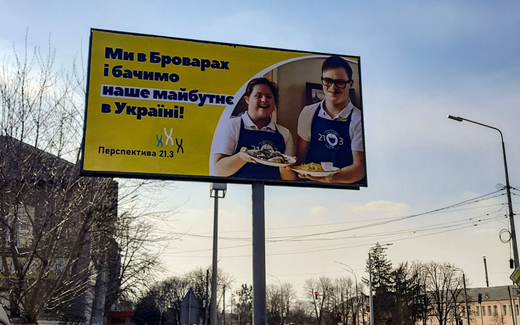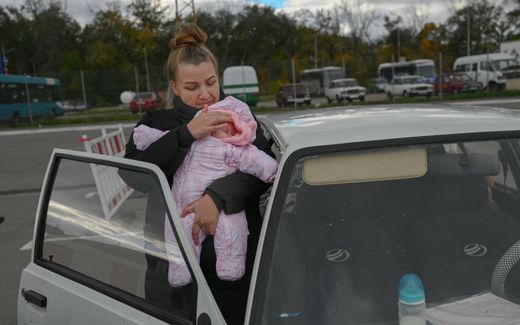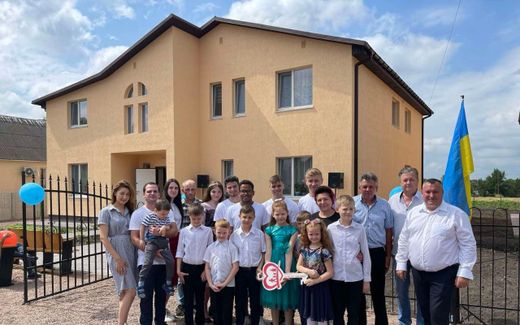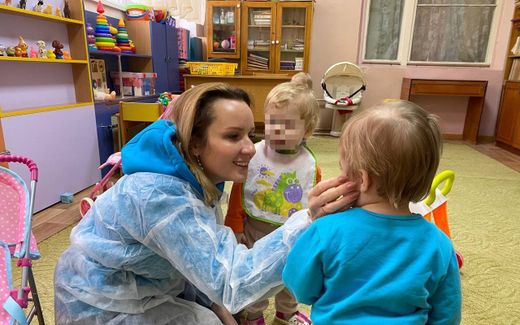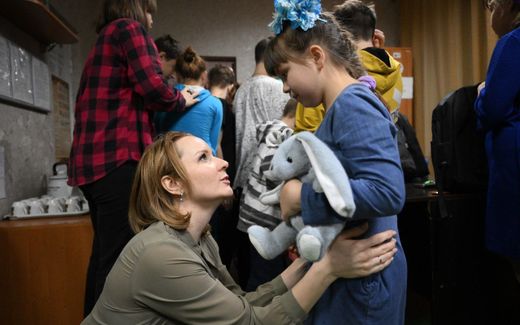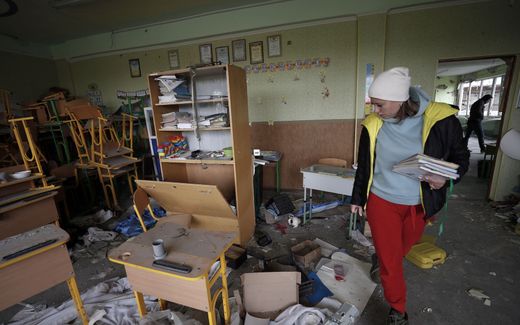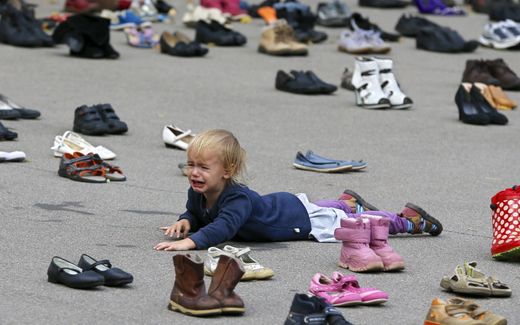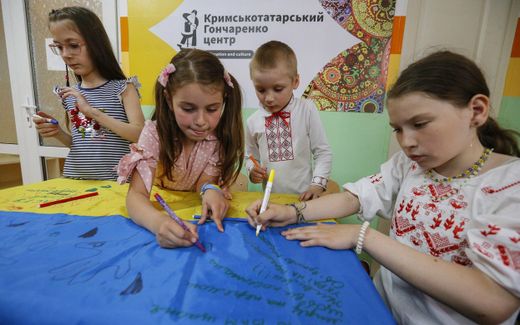Ukrainian orphan in the Netherlands is happy with a bit of attention
29-07-2023
Western Europe
Anne Lok-Vader, RD
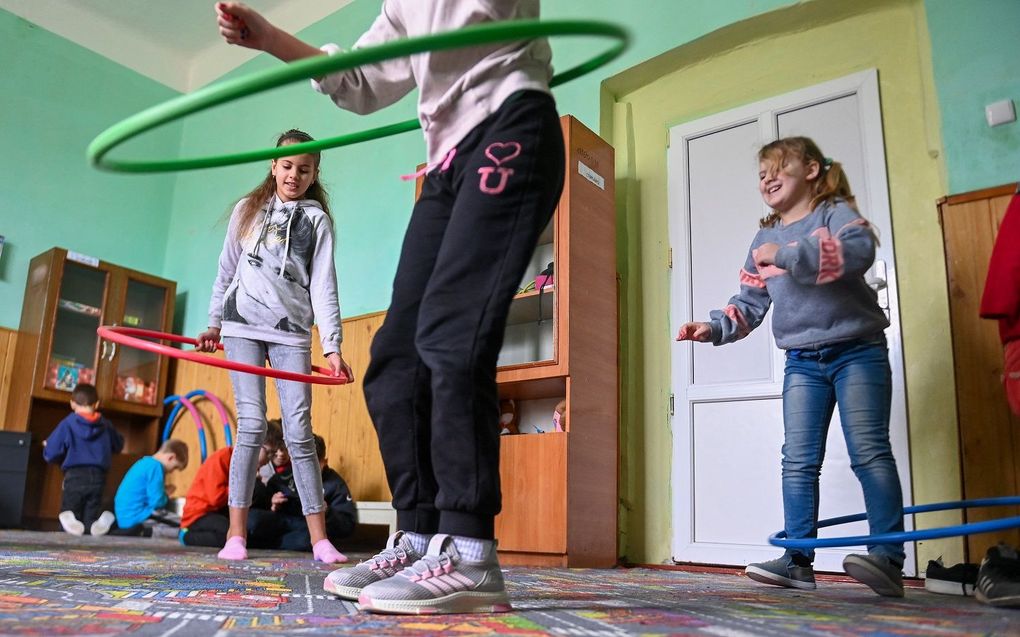
Children in a Ukrainian orphanage, not the one in the article. Many of them were evacuated because of the violence of the Russian invasion of Ukraine. Photo AFP, Attila Kisbenedek
Western Europe
Some toys, a swing and a balloon. Ukrainian children do not need much more to enjoy their holidays. A look in the Dutch town of Kesteren, behind the doors of an orphanage with children who fled the violence of war in its own country.
Peace reigns early afternoon in the former police station in Kesteren. In the rooms where detainees were once locked up, and suspects were questioned, there are now children in bed. War refugees from Ukraine without a father or mother. Toddler or preschooler, asleep or awake - it doesn't matter. They are all quiet.
A year and four months ago, a touring bus filled with 63 maxi-cosi full of crying children -now aged between 2 and 7 years - and their attendants drove into the village. Overflowing nappies left a terrible stench. Fear was in the children's eyes: some feared they had been kidnapped to Russia.
A few weeks earlier, a group of people from a Reformed church in the region sat together for the first time. They mobilised 300 volunteers and raised 300,000 euros in donations. Numerous items were donated - from playpens to vans. Selflessly, construction workers helped prepare the shelter. "This is our region at its best," beams director Pieter Slagboom (47).
Reception
Olena Matvieienko (62), director of the orphanage, puts her hands in front of her face as she thinks back on the reception. "Never will I forget it," she says, as tears roll down her cheeks. "The beds were ready; food was stocked, transport arranged. The staff were given accommodation in external locations, and the children were able to go to school."
Volunteers still help run the orphanage. Even before the holiday period, there were enough people to fill the schedule, say coordinators Henrieke Boon (39) and Margreet Langelaar (44). Johan van der Kolk (67), for instance, goes for a walk twice a week with a group of children. During the walk, he sometimes makes a stop at the playground or the petting zoo. "It's rewarding work. As long as they are here, I will keep doing this." Having a conversation is difficult, but that does not get in the way of a bond with the children, the volunteer assures. He simply teaches them some Dutch words along the way: car, tree, plane.
Van der Kolk now drives around with a walking trailer that fits six children. They were able to buy the vehicle -which cost: 1,200 euros- thanks to a crowdfunding campaign on Facebook. Slagboom: "We were hoping for one trailer; we got six."
Clothes
Last week, volunteers treated the children to a day trip to the zoo in the Dutch town of Rhenen. And on Tuesday, the ladies took some girls to the shop to buy new clothes. "They were beaming in front of the mirror. One even hugged the salesperson," Boon says.
Far trips or spectacular outings are not necessary for these little war refugees, Slagboom explains. "We already think after a day of rain: the children will be bored, so we need to get away. But remember: these orphans have nothing. So they don't need much." "They already enjoy a bit of attention from a staff member or volunteer," Langelaar adds.
Disabilities
Living in an orphanage does not necessarily mean that these children's parents have died. Orphans have been abandoned, have disabilities or behavioural problems. Others do not live at home because of an addicted father or mother.
Soon the volunteers noticed that orphans have little value in the former Eastern Bloc country. "The children are approached as a group, not as individuals," Boon explains. "Celebrating birthdays, for example, they do not know. The children did not have a clue about what was happening when the Dutch teacher made a party hat for a birthday boy. Nobody knew who should wear it." On a subsequent birthday, they all pointed to the child who was walking around with the hat last time.
Funeral
Meanwhile, in the kitchen, a lady in a white hat prepares potatoes. The peels fall into a large rubbish bag between her feet. On the kitchen counter are trays full of sliced cabbage, aubergine and courgette. Today she is cooking ratatouille. "For a whole orphanage," Slagboom laughs.
Until last month, there was another orphanage in town. Because the building where that group stayed was not suitable for long-term care, they moved to another place in the Netherlands last month. The old police station in Kesteren must also be vacated by the end of this year. The orphanage will then get accommodation in the nearby village of Dodewaard.
In the second orphanage lived Vitalii. A three-year-old boy with Down syndrome who suffered from a heart defect. Vitalii ended up in the hospital and suffered complications. When Slagboom arrived with the directors and pastor, the little boy was already lying lifeless in the arms of a staff member. His death, last March, hit hard. People from the region arranged the funeral and mourning service. "The Ukrainian supervisors did not understand that we have so much love for a strange child," says Slagboom.
Since last week, there has been a tombstone on the grave of Marktstraat in Opheusden. With a text in two languages from Psalm 31: "My times are in Your hand".
Choir
"Why did these people come to the Netherlands?" Slagboom ponders. Staff from the orphanage now attend church every week instead of only at Christmas and Easter, as they were used to in their own country. They listen live on Sundays to a Ukrainian meeting in a different Dutch town. "In the beginning, people sat with tears in their eyes during the singing," Boon recalls. "They didn't know that: in the Eastern Orthodox Church, only the choir and the priest sing."
Bible knowledge among Ukrainians is limited, Slagboom discovered. On Sunday, he spoke to another woman who did not even have a Bible. Yet he marvelled at how refugees receive the Gospel. After a sermon on the valley of barren bones, he asked a visitor, "Didn't you find it difficult?" She shook her head. "This is exactly our situation."
Children hear Bible stories at the Christian Rehoboth School. Disabled children go to a daycare Employees receive catechesis from evangelisation materials. "God is fulfilling His counsel. Also, in this war," Slagboom states.
Relaxation
Matvieienko, the President of the orphanage, says that she is happy to have come into contact with the Reformed churches in the Netherlands. "I appreciate that through them, we get God's Word explained in understandable language," she says. According to her, this has caused "slight relaxation in the trauma of war". And: "Among ourselves, we have less conflicts. That in turn also gives the children more peace."
The war is little talked about with the children. They are too young for that: between 2 and 7 years old. "They don't really know what war is either: we left Ukraine pretty early," Matvieienko explains.
Among the employees, the situation in the homeland is very much alive, Langelaar observes: "They live here, but their heads are there. They constantly follow the news." Staff do everything they can to ensure that the children do not forget their homeland, the President assures. Reading aloud and singing in their mother tongue is, therefore, something she finds important. "The children have no idea of a place. For them, Ukraine is mainly connected to persons: those who speak the language and make them feel at home."
Balloons
A little after half past three, yelling voices fill the grounds. Children fly towards the volunteers, crawling on their laps and hanging around their necks. With stern looks, the supervisors watch the ongoing scene. "They don't understand that you can give love to children you don't know," Langelaar explains.
The brightly coloured balloons the children play with do not survive long on the street. A boy arrives with a piece of string with a pathetic piece of green plastic still dangling from it. He looks expectantly at Langelaar. She shakes her head. "It is broken. I can't fix it anymore," she explains through the translation app. When the little boy hears the message, he bursts into a heartbreaking cry. He is beyond comfort.
"I sincerely hope they can go back soon," Langelaar says. "But I have come to love these people."
This article was translated by CNE.news and published by the Dutch daily Reformatorisch Dagblad on July 27, 2023
Related Articles

